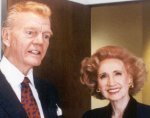Radio HOF
Jones, V.A.L.
 V.A.L. Jones – Legacy
V.A.L. Jones – Legacy
V.A.L. Jones was literally the first lady of St. Louis radio. She was the first announcer, program director and scriptwriter at KSD, the market’s first commercial radio station.
Miss Jones was the subject of several articles in national radio publications of the day for her work in getting the station on the air in 1922. “Radio in the Home” wrote in September 1922 of her distinctive voice, “You recognize it among the voices of other radio announcers for its clearness of enunciation, for the purity of diction it employs…”
She was said to have received thousands of letters from listeners, and her on-air identifier was simply “Miss Jones announcing.” Virginia Adele Laurence Jones spent five years at KSD, having been hired by owner, the St. Louis Post-Dispatch, because of her knowledge of the city, her musical knowledge and her writing ability, which she had demonstrated as a rewrite person at the paper.
In the station’s first year, Miss Jones held weekly auditions for on-air performers, usually hearing 50 – 60 acts per week.
She left KSD when she married an engineer from another local station and he was transferred to Kansas City.
